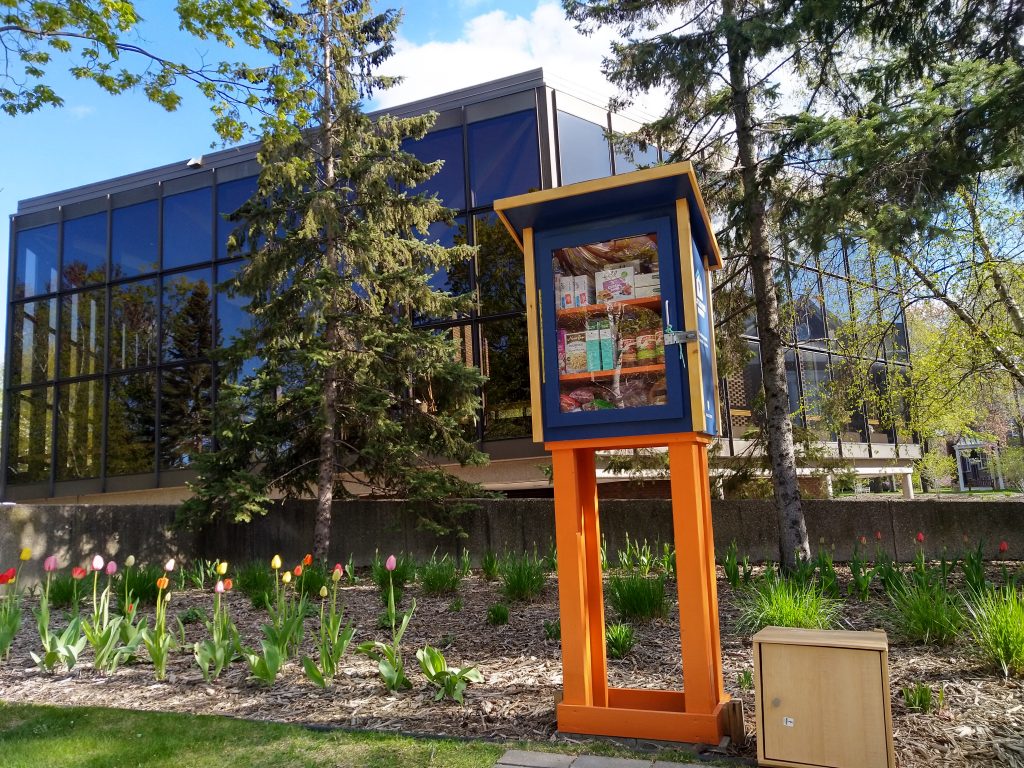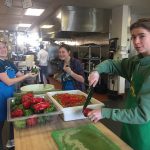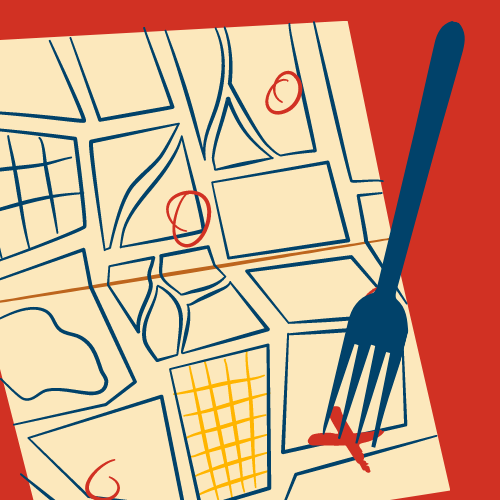Food Access
Contact
Community Engagement CenterMarkim Hall, Third Floor 651-696-6040
cec@macalester.edu
facebook twitter instagram


Food insecurity is an issue facing students as well as local community members. There are many options for students to supplement their food resources and engage food justice work on and off campus. See the various sections of this page to learn how you may engage: receive support as needed, give support as you are able.
Food Resources at Mac
Open Pantry
Open Pantry is available for all Macalester students to have access to a supplemental source of food and essentials through the academic year and during summers. It mostly stocks pantry items, shelf-stable goods, and some personal care items. Students have the option of placing an online order for pick-up, or shopping in person at the pantry.
Located in Campus Center 227 (past the MCSG office)
Hours are updated weekly and posted in the Mac Daily. Online orders can be picked up after the Pantry may be closed.
Contact: Neno Grae [email protected]
Little Free Pantry
This small stand alone food pantry is a place for community members to access or donate non-perishable food. This project is for Macalester members and the local community—available to anyone who happens to walk by.
It is open and accessible 24 hours a day on Grand Ave in front of the Chapel
Contact: CRSL [email protected]
MacFEAST
MacFEAST is Macalester’s largest food justice and sustainability student organization with a number of smaller groups under its umbrella, including Food Recovery Network, MacSHARE, and Empty Bowls. All these groups work to educate and engage students about food and sustainability at Macalester and in the Twin Cities. Check out their Facebook page here
Food Recovery Network
The Food Recovery Network is a student-led movement for donating excess dining hall food from universities across the country. The Macalester chapter repacks leftover food from Cafe Mac and donates it to the local community.
MacShare
A student-run cooperative that sells produce and dry bulk goods to the Macalester community at weekly pop-up sales. They purchase produce in bulk from local producers or food hubs and sell everything by the pound, at-price. Any food that remains unsold is purchased by Macalester’s Cafe Mac/Bon Appétit. It’s a convenient and affordable way for students to access fresh produce. Sale dates are posted on their Instagram @Mac.Share and in the Mac Daily.
Email: [email protected]
MULCH/MacCARES
Macalester Urban Land and Community Health is a student organization that runs an on-campus community garden and chicken coop in conjunction with the EcoHouse. They provide hands-on experiences for students to try urban gardening. In the summer and early fall, the garden is open for the campus community to volunteer with planting, weeding, and harvesting. They also host events and outreach throughout the school year to provide education on urban food sourcing and sustainable food and agriculture.
Food Resources in the Neighborhood
Keystone – Midway
Walk-through food shelf – open to all
1916 University Ave W (2 miles)
Hours: M-F 10 am-12:30 pm
Comet’s Cupboard
Concordia college’s food shelf, open to the public during Covid
1282 Concordia Ave (1.3 miles)
By appointment only. Schedule here: https://cometscupboard.youcanbook.me/
Hours: M-F 9 am-3 pm
Interfaith Action/ Department of Indian Work
Emergency food resource for those with tribal affiliation.
1671 Summit Ave (0.2 miles)
Fill out an application to become a client: https://interfaithaction.org/what-we-do/diw/emergency-services/application/
Open Hands Midway in Bethlehem Lutheran Church
1 mile away North on Snelling (bus 84)
Every Monday 12-2 pm (excluding major holidays) offer a nutritious hot meal and bakery items for FREE to anyone in need
Food shelf including fresh produce is open at different times throughout the week. Visit their calendar to learn more:
Website: https://www.openhandsmidway.org/programs
The Midway Food & Empowerment Project
Every Wednesday from 12-1:30 pm
Hancock Rec Center, 1610 Hubbard Ave, St. Paul, MN 55104
(1.9 miles straight north of campus)
Learn more at https://www.hamlinemidway.org/TheMidwayProject
Fare for All
Cooperative purchasing program. Pop-up sales at rotating locations with frozen food up to 40% off. Often held at West 7th Community Center.
Facebook and website have updated list of sales:
https://fareforall.thefoodgroupmn.org/
Resources a Little Further Away
The Neighborhood House Food Market
Food shelf – open to all during Covid
Pre-packaged food bags include fresh produce, bread, refrigerator and dairy items, canned and boxed foods, frozen meat, and cooking oil
Curbside pickup – call (651) 789-2534 when you arrive
Delivery possible – call (651) 789-2534
Hallie Q. Brown
Food shelf – open to all
270 N Kent St. (3 miles)
Customizable pre-packaged food boxes
By appointment only. Fill out this form: Hallie Q. Brown Food Shelf Request Form
Pick-up and delivery options
The Francis Basket Food Market
1293 E Maynard Dr. (3.2 miles)
Walk-up food shelf
Pre-packaged food bags include fresh produce, bread, refrigerator and dairy items, canned and boxed foods, frozen meat, and cooking oil
Hours: Monday 9-11:30 am, Tuesday and Friday: 9-11:30 am, 1-3:30 pm
Loaves and Fishes
Website with map locations of resources available
Community meals served at the Dorothy Day Center (Higher Ground) all week at 4:30-5:30 pm
4.3 miles east of campus
Information on SNAP
The Supplemental Nutrition Assistance Program (SNAP) is a federal program that provides financial assistance to one’s food budget. If you are found eligible, you will receive SNAP benefits on an Electronic Benefit Transfer (EBT) card, which works like a debit card. Benefits are automatically loaded to your account each month, and the amount is based on income and household size. You can use your EBT card to buy groceries at authorized food stores and retailers.
The Consolidated Appropriations Act 2021, temporarily expands SNAP benefits eligibility to include more students enrolled at least half-time in an institution of higher education, who either:
- Are eligible to participate in state or federally financed work-study during the regular school year, as determined by the institution of higher education, or
- Have an expected family contribution (EFC) of $0 in the current academic year.
Beginning on Jan. 16, 2021, students who meet one of the two criteria outlined above may receive SNAP if they meet all other financial and non-financial SNAP eligibility criteria.
You are instructed to apply to the SNAP program in the state of your current residence. Information on individual state programs can be found on the SNAP State Directory of Resources. Please be sure to read the eligibility criteria. If you have questions about whether or not you meet certain criteria for eligibility, please contact your current state of residence’s SNAP office.
Second Harvest Heartland has a SNAP Outreach Team that can offer assistance in applying for SNAP benefits. Visit their website and click “Take the first step” to take a short screening survey to determine if may be eligible and to get connected with a SNAP Specialist on their team.
International Students are not eligible for SNAP benefits because they are considered a “public charge,” and that would affect their immigration status now and in the future. If students have questions, they should contact International Student Programs.
Opportunities to Give
Macalester has longstanding, reciprocal relationships with several organizations in this space. Consider supporting the following with your time and resources:
Support the Little Free Pantry at Mac by donating to the Emergency Aid Fund via the Macalester Fund website. Mac staff, faculty, and departments can sign up to stock the pantry after reading the Caretaker’s Guide (must have a Mac email to access both). Email [email protected] with questions.
Open Arms grows vegetables and herbs for various kitchen and CSA programs at multiple urban farm sites in the Twin Cities. Donations directly help provide nourishing, free meals for those in the local community living with a life-threatening illness. Learn more about volunteer opportunities here.
Hallie Q. Brown Center Inc.
The mission of Hallie Q. Brown is to improve the quality of life for community members by providing access to critical human services, fostering and promoting personal growth, and developing community leadership. Volunteers can assist with the food shelf and clothing closet, among other programs.
Neighborhood House is a multicultural, multilingual community center with programming for all ages and open doors for all people. It is often a first stop for new immigrants and refugees to the Twin Cities. Volunteer to distribute or donate food here.
Second Harvest Heartland is a food bank that distributes donated grocery products to 700 human service agencies in Minnesota and Wisconsin. Group and individual volunteer projects include repackaging bulk food donations, and sorting and assembling food packages.

Do you have questions or comments about anything you read on this page? Is there information missing that we should add? We’d love to hear from you! Email us at [email protected]. We will continue to update this site continuously, and appreciate your feedback!